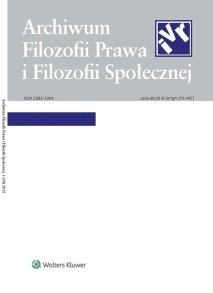Racjonalność komunikacyjna jako podstawa legitymizacji good governance
Communicative rationality as the basis for the legitimacy of good governance
Author(s): Mariola ŻakSubject(s): Governance, Politics and law, Philosophy of Law
Published by: Stowarzyszenie Filozofii Prawa i Filozofii Społecznej – Sekcja Polska IVR
Keywords: good governance; networks; legitimacy; instrumental rationality; communicative rationality; universal pragmatics; transcendental pragmatics
Summary/Abstract: The main aim of this paper is to demonstrate that the concept of good governance, based on the theoretical description and methodology of the sciences of organization, public management and economy, auxiliary extending to other reconstructive sciences (political science, sociology, psychology), has the cognitive dimension, referring to the practical reasoning of individuals. Through subjection of specific strategies to the communicative rationality, depending on the normative context, the different ways of public sector management may be selected by the public agencies to a specific area of social relations. This choice is made based on the rational consensus, concluded between the stakeholders and the so-called depositary of the law, by which is meant the professionals associated with the performance of the public service: the politicians, the lawyers and the law-applying officials. The article shows the application of the theory of the communicative ethics: the universal pragmatics of J. Habermas and the transcendental pragmatics of K.-O. Apel in order to explain and justify good governance model.
Journal: Archiwum Filozofii Prawa i Filozofii Społecznej
- Issue Year: 15/2017
- Issue No: 2
- Page Range: 98-114
- Page Count: 17
- Language: Polish

